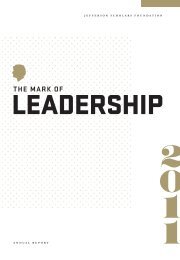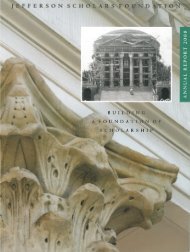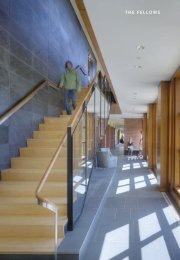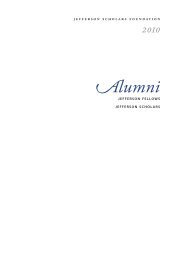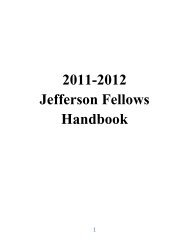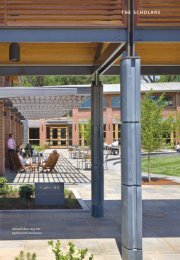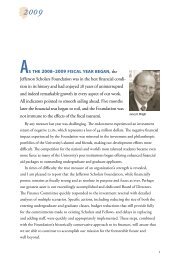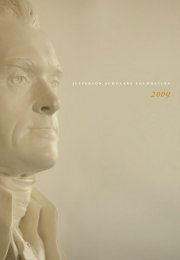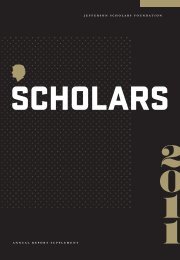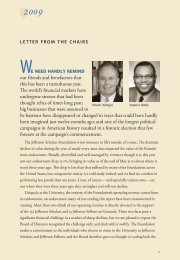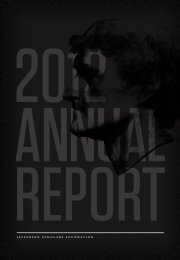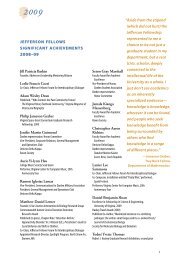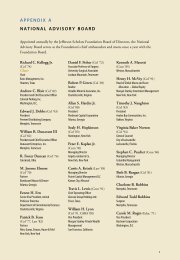2010 - Jefferson Scholars Foundation
2010 - Jefferson Scholars Foundation
2010 - Jefferson Scholars Foundation
You also want an ePaper? Increase the reach of your titles
YUMPU automatically turns print PDFs into web optimized ePapers that Google loves.
jefferson scholars foundation <strong>2010</strong><br />
Mary Hicks, the Newman Family Fellow (History), talks to a group about domestic<br />
servants in Brazil.<br />
throughout the life of a product.<br />
Life cycle thinking advances a<br />
holistic approach to operations<br />
that focuses on maximizing<br />
value and minimizing negative<br />
environmental and social impact<br />
throughout the value chain.<br />
Ultimately, a life cycle approach<br />
can promote a more sustainable<br />
rate of both production and<br />
consumption and can help use<br />
limited financial and natural<br />
resources more effectively.<br />
abuses. During the decade<br />
leading to emancipation in 1888,<br />
many ex-slaves and their descendents<br />
also sought to break bonds<br />
of rural patronage by relocating<br />
to Salvador, Bahia, one of the<br />
largest cities in Brazil. My study<br />
focuses on the increasing mobility<br />
of these people as they left the<br />
hinterland to become domestic<br />
servants in the provincial capital.<br />
The migration of ex-slaves (and<br />
runaways) to the city of Salvador<br />
and the subsequent renegotiation<br />
of labor relations between master<br />
and servant provoked elites<br />
to respond by limiting this new<br />
threat to their patriarchal domination.<br />
This period also reveals the<br />
faint beginnings of state labor<br />
regulation of the popular classes.<br />
The end of slavery coincided with<br />
and produced legislation aimed<br />
at domestic servants and other urban<br />
professions, which attempted<br />
both to prolong social and labor<br />
relations deeply influenced by<br />
slavery, as well as to incentivize<br />
the transition to wage-labor.<br />
ray lamas<br />
Where’s the plane going?<br />
The Future of the Large<br />
Commercial Aircraft<br />
Industry<br />
This project will examine the past,<br />
current, and future levers of value<br />
of the large commercial aircraft<br />
industry, focusing on what have<br />
been successful companies and<br />
their approaches to business, as<br />
well as the failures and the lessons<br />
mary hicks<br />
migration, mobility,<br />
gender, Race, and Labor<br />
Relations among Urban<br />
Domestic Servants in<br />
Salvador, Brazil, 1887-1893<br />
During the long period leading<br />
to slave emancipation in Brazil’s<br />
empire (over fifty years), Brazilian<br />
slaves of African descent had<br />
begun increasingly to challenge<br />
the dominance of the landed,<br />
slave-holding elites that had<br />
constituted the nation’s governing<br />
class for over three centuries.<br />
Slaves ran away, renegotiated<br />
labor conditions with their owners,<br />
and appealed to governing<br />
authorities to stem physical<br />
Ray Lamas, the Melville <strong>Foundation</strong> Fellow (Darden School of Business), discusses the future of<br />
commercial aviation with prospective <strong>Jefferson</strong> Fellows.<br />
116



